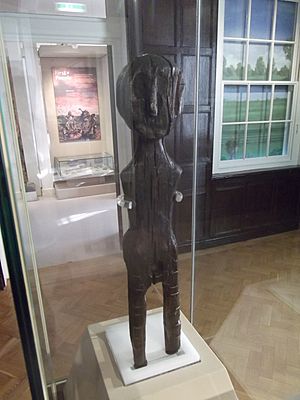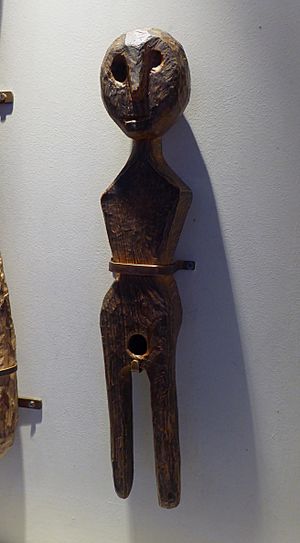Dagenham idol facts for kids
The Dagenham Idol is a special wooden statue shaped like a person. It was discovered in Dagenham, East London, England, in 1922. This ancient statue is very old, dating back to about 2250 BC. This time was known as the late Neolithic period or the early Bronze Age. This makes it one of the oldest human-like figures ever found in Europe!
What is the Dagenham Idol?
The Dagenham Idol is carved from Scots pine wood. It stands about 18 inches (46 cm) tall. The statue has two legs but no arms. It has a narrow waist that widens at the hips and shoulders. The head is rounded. You can see straight lines carved across both legs. There is also some damage to its left eye.
How Was It Found?
The statue was found in 1922. Workers were digging for sewer pipes in a marshy area. This area was on the north bank of the River Thames, east of London. Today, this spot is where the Ford Dagenham factory stands.
The idol was buried deep in the ground, about 3 metres (9.8 ft) below the surface. It was found in a layer of peat, which is a type of soil made from decayed plants. Near the statue, workers also found the bones of a deer. Experts believe the statue might have been buried with the deer as a special offering. People in ancient times sometimes made offerings to gods or spirits. They hoped these offerings would bring good luck or help things grow.
Where Can You See It?
The original Dagenham Idol is owned by the Colchester Castle Museum. However, you can see a copy of it at the Museum of London. Since 2010, the original statue has been on display at the Valence House Museum in Dagenham. It is on a long-term loan there.
See also
- List of Stone Age art
- Broddenbjerg idol
- Roos Carr figures
- Ralaghan Idol
- Anthropomorphic wooden cult figurines of Central and Northern Europe
 | Misty Copeland |
 | Raven Wilkinson |
 | Debra Austin |
 | Aesha Ash |



